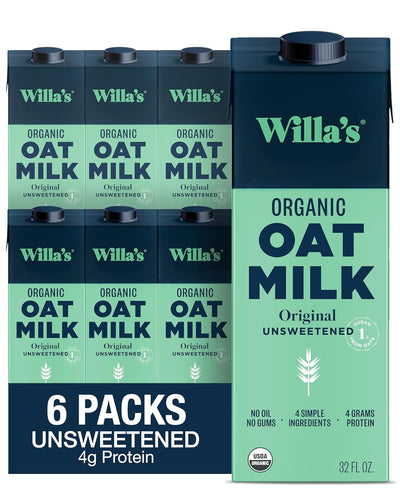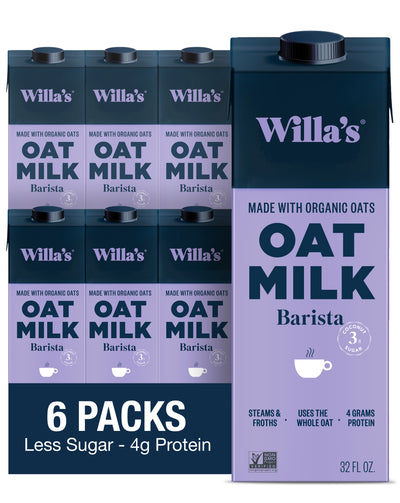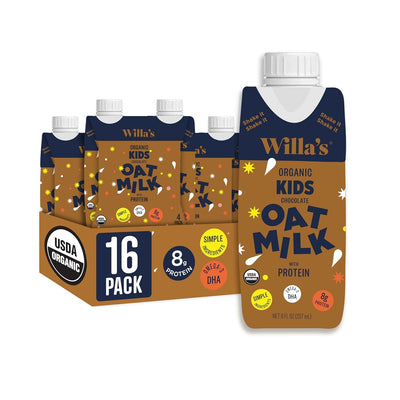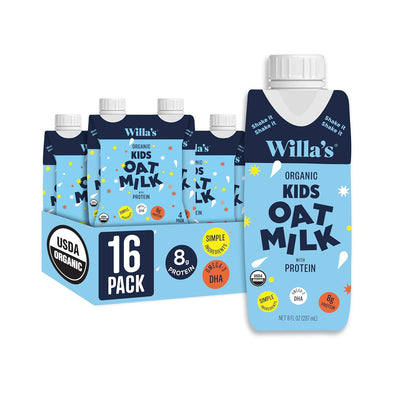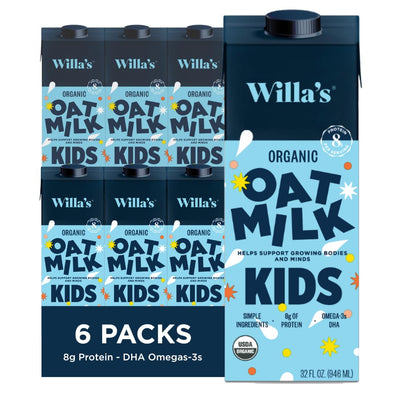Is Willa's Oat Milk Glyphosate-Free?

At Willa’s, we are dedicated to using ingredients that support human health as well as the health of our planet. That’s why we use certified USDA Organic oats and make sure all of our products are Certified Glyphosate-Free by The Detox Project. Roundup (glyphosate) is not something we want in our oat milk! And it also doesn’t belong in our soil or groundwater.
What is Glyphosate?
Glyphosate is the active ingredient in Roundup, and a widely-used chemical herbicide linked to serious health risks. Glyphosate is commonly used in conventionally grown oats as well as wheat and chickpeas. As a result, there are growing concerns about glyphosate’s occurrence in oat milk.
Is Willa’s Oat Milk Certified Glyphosate-Free and Certified Organic? YES AND YES!
All of Willa’s Oat Milks are Certified Glyphosate Residue Free. This certification means our products have been thoroughly tested and confirmed to contain no glyphosate residues down to government-recognized limits of detection for food.
We also use USDA Organic oats, which are grown without the use of any pesticides, including glyphosate. USDA Organic Certification involves very stringent qualifications and prohibits the use of glyphosate, as well as similar pesticides.
Glyphosate in Oat Milk: What You Need to Know
Many oat milk brands on the market contain glyphosate. Scientific studies including one by the IRAC (International Agency for Research on Cancer) have linked glyphosate exposure to increased cancer risk, among other health concerns like endocrine disruption, fertility issues, and digestive issues like celiac disease.
At Willa’s, we are committed to producing products that are completely glyphosate-free. Our organic oats are grown without any pesticides, ensuring that our oat milk is as clean and safe as possible. Through The Detox Project, all of our products are thoroughly tested to guarantee that no traces of glyphosate or other harmful chemicals are present.
Glyphosate’s Environmental Impact
Beyond human health, non-organic farming practices and those involving glyphosate take a toll on the environment. The use of chemical pesticides and herbicides harm soil quality and contribute to pollution in rivers and lakes through agricultural runoff, negatively affecting aquatic life and biodiversity.
Organic farming, on the other hand, promotes healthier soil through carbon sequestration, reduces chemical pollution, and supports the biodiversity of ecosystems we rely on. By choosing organic and glyphosate-free products, you’re not just making a healthier choice for yourself—you’re also supporting the environment.
What is the connection between organic oats and the microbiome?
Organic oats are a cover crop and high in prebiotic fiber, which feeds healthy gut bacteria and supports a healthier microbiome. Organic oats also support the microbiome of the soil, which allows the soil to sequester more carbon.
On the flip side, glyphosate has a negative impact on our microbiomes as well as the soil health.
Organic matters!
Willa’s Commitment to Health and Sustainability
At Willa’s, we don’t just exist to create another oat milk. We aim to have a net positive impact on the health of people and the planet! We are fully committed to producing oat milk in the most responsible and transparent way possible.
With health and environmental sustainability at the heart of everything we do, we ensure our products are glyphosate-free, organic, and made with care. You can feel confident that when you choose Willa’s, you’re choosing an oat milk that’s safe for your family and the planet.
For more information, check out Willa’s FAQs. And for more information on why Willa’s uses the whole oat (not just oat sugar), check out our blog posts!

